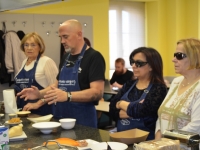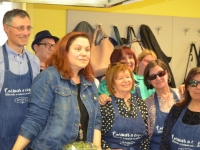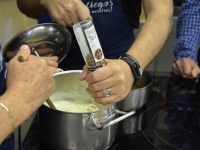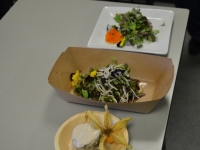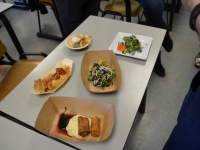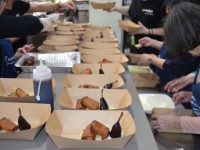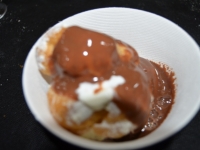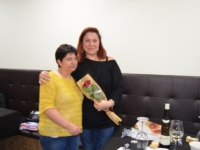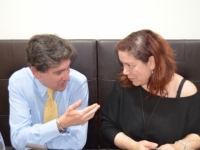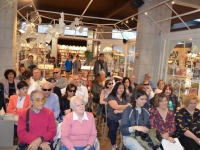Health
Cook and read blindly, a project in Spain joins kitchen and books
Developed by the ONCE
USPA NEWS -
Imagine a meal with friends in any restaurant. Imagine well-presented dishes full of flavor. Imagine now that this banquet has been made entirely by blind people or with less than 20% vision. That is what the cooking group of the National Organization of the Blind of Spain (ONCE in its initials in Spanish) did on the occasion of the book party in Logrono, capital of the wine region of Rioja, where the Spanish language was born.
A banquet for fifty guests at a restaurant named after the Cid's sword, Rodrigo Diaz de Vivar, a prominent figure in medieval Spain. The Tizona restaurant in Logrono hosted a banquet entirely prepared, presented and served by blind people or with less than 20% vision. The ONCE kitchen group, supported by another group of the organization: the reading group. Because it was a special banquet, dedicated to books.
Care Santos is a Spanish writer, winner of the Nadal Prize with her novel 'Half Life'. She declares herself a fan of the kitchen and, as a result, in her book she includes the recipes of a menu prepared by the five protagonists of her story. The reading group of the ONCE had just read the novel and, when their colleagues in the kitchen group asked them for advice to link the banquet they prepared with a book, they had no doubts: Care Santos's novel was the right one for that celebration.
"I feel privileged," Santos explained to USPA News. "It's a privilege. Until now, this novel lived on paper; now it has come alive." The writer went to Logrono to share with the chefs and guests of ONCE the menu of her novel. "I feel totally reflected, the menu is exactly the same. Angel has reinterpreted it because he is a professional of this and he knows, he has modernized it." The menu, consisting of salad of shoots, gulas and flowers with aroma of garlic and truffle; coulant of eggplant, parmesan and anchovy; American Stail monkfish and shrimp crepês, and profiteroles of cream with chocolate, was adapted to the availability of ingredients and the skills of the cooks, explained Angel Palacios, the chef director of the ONCE's cooking group.
In 'Half Life', Care Santos "portrays a generation of women who had to build their destinies at a time when the hypocrisy of those who wanted to maintain forms at any price faced new views on friendship, love and freedom," emphasizes the editorial in the book review. The winner of the 2017 Nadal Prize has published ten novels, six short story books, two poetry books and numerous novels for children and young people. His work has been translated into 22 languages.
From the first moment, the writer "was delighted" with the ONCE proposal. The experience, he said during the meal, was impressive, admirable the work of the blind cooks, who meet every week to continue learning and practice. "This is the first time something like this has been done at a national level," Angel Palacios explained to USPA News a few weeks ago. "The protagonists celebrate a meeting in the restaurant 'Half Life' and we will interpret the menu, how we have perceived it, with the creativity that I see in the dishes, with the collaboration of a chef because it is a very feminist work and for me it is a tribute to women, who are true fighters."
Then, the chef explained that these initiatives are not put in place to see why they will not recover their sight, but to see them. The ONCE has been working for more than 75 years for the integration of the blind, to develop their personal autonomy and provide them with all the necessary tools that allow them to improve their quality of life. Before they counted only with the help of guide dogs; today, they have mobile applications that reveal the color of the clothes they wear or the location of obstacles that hinder their movements. The good news, according to the organization's leaders, is that there are fewer and fewer total blind people and there is almost no blind child born in Spain. Having a rest of vision is important for the daily life of these people. The result is spectacular.
Liability for this article lies with the author, who also holds the copyright. Editorial content from USPA may be quoted on other websites as long as the quote comprises no more than 5% of the entire text, is marked as such and the source is named (via hyperlink).

